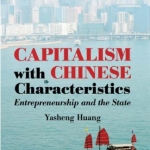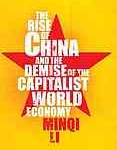Articles tagged with: capitalism
Contemporary China, LangYan, Reviews »

Joel Andreas reviews Huang Yasheng’s Capitalism with Chinese Characteristics in the latest New Left Review, which also contains a response from Huang.
Andreas: “Huang’s diagnosis of the maladies afflicting rural China is clearly informed by one of the foundational myths of neo-classical economics—the ideal of competitive capitalism. Free competition, it is assumed, creates a level playing field on which small entrepreneurs naturally flourish. If small entrepreneurs are squeezed out, it must be the fault of the state, which tips the playing field to the advantage of favoured players. The reality is quite different. Market competition intrinsically centralizes property without the need for state intervention. Winners squeeze out losers, amass capital, capture market share and block new entrants. The state often facilitates this process by favouring the winners, but it can also inhibit it by protecting the weaker players. Over the last two centuries, peasants and small rural entrepreneurs have been the main losers as capitalism has swept across the globe.”
Chinese Revolutionary History, Contemporary China, International Observer »

For much of the working class and oppressed communities in India, the Chinese “model” is not its current capitalist market system, but the socialist revolution that preceded it under the leadership of Mao. In both nations the desperation of hundreds of millions in the face of “globalization” is growing, now heightened by the worldwide capitalist crisis. Though each government has shown an ability to buffer some of the worst effects of this collapse, and taken recent measures to ameliorate the burdens on the working classes, in the longer run they will not be able to escape the growing contradictions of world capitalism. Already, in both China and India, protests against ever widening polarization, impoverishment, corruption, land thievery and ecological devastation are growing in number, size and violence. For the Chinese, who had a revolution and then turned back to the capitalist road, it would take a major reversal to once again move toward socialism. India never had a similar revolutionary socialist transformation, but the forces to carry it out are stronger now than ever. The Indian and Chinese working classes and leftist forces today increasingly face parallel conditions under global capitalism led by an imperial United States. Though they have little contact at present, the future may bring a new unity, as the contradictions of the world capitalist system deepen and drive them more closely together.
LangYan, Ongoing Struggles, Workers, 中文资料 »

For the protection of workers’ rights and the right to democratic election of worker representatives, the workers of Honda Auto Parts Manufacturing Co. Ltd has stopped work for nearly half a month. During the stoppage of work, we received support from both the domestic and international communities. The support has given tremendous boost in the morale of the workers’ struggle!


